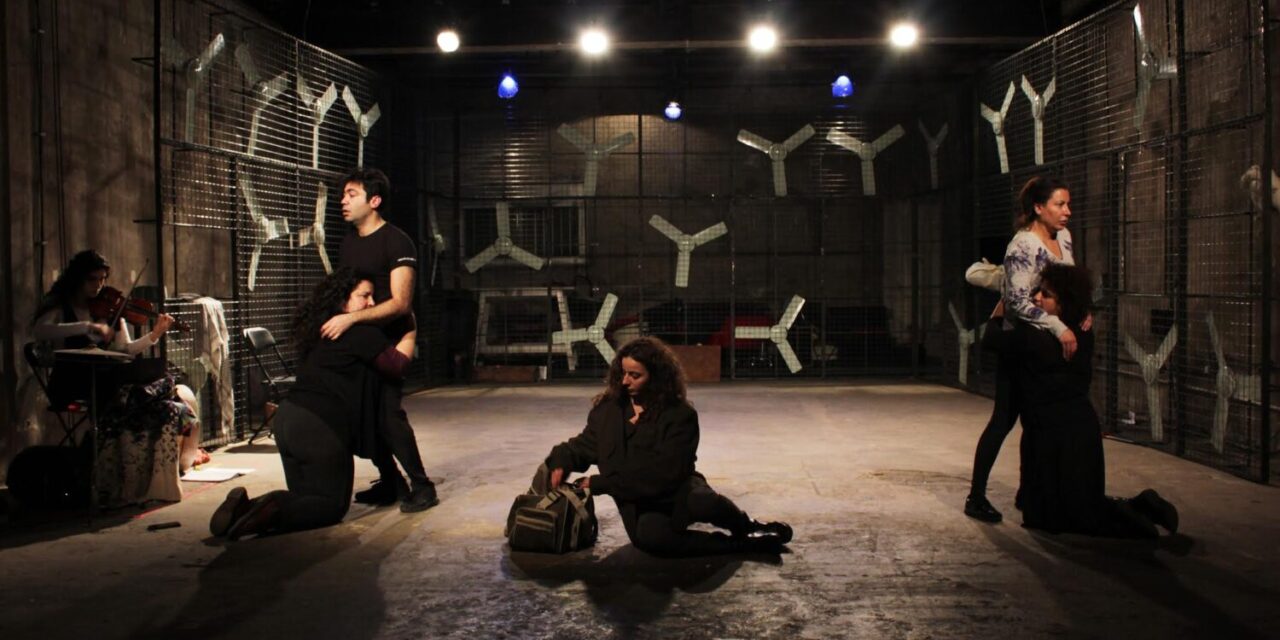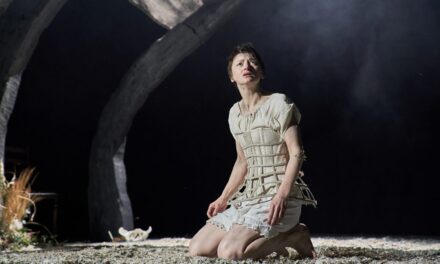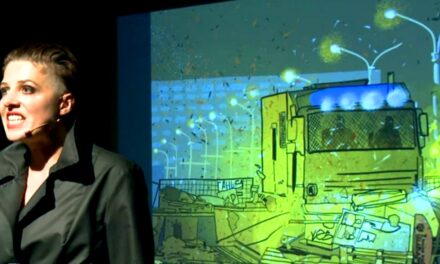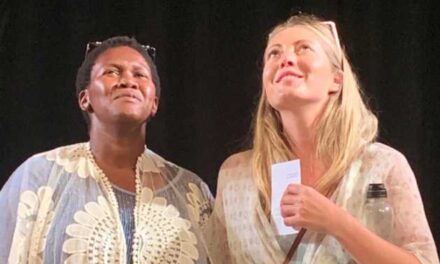Ghalia’s Miles brilliantly brings the crude harsh reality of the Middle East to life. It pierces deep down into the soul, with razor-sharp effectiveness, twisting once buried within to ensure the job is done, and the pain is mercilessly felt. Once again, the theatre company Zoukak dissects Arab societies layer by layer, emotively and passionately touching the very roots, where the rotted and decayed somehow cohabitate with that which is beautiful. In a region where patriarchy reigns supreme, a young Christian Lebanese Woman, “Ghalia”, (*an Arabic name meaning expensive, or precious) begins an incredible journey forever changing her innocence to the dark realities that lie in waiting.
Falling pregnant to a half Palestinian man, we follow each stage of her life thereafter. Incredibly, five actors in total, take on multiple characters roles throughout the story. They combine acting with storytelling to keep the audience informed throughout. We learn quickly that the story is far from innocent. The script is political and relevant and doesn’t shy away from brutality and brazenly blunt sentiments. Pregnant and fearing her sectarian minded uncle may indeed kill her, Ghalia (Rym Mroueh) flees in a desperate attempt to make it to Europe and create a new life for herself and expectant child.

Photo by Marianne Kortbani.
The journey is long, and the struggles and tribulations ever-present. In the vein of Homer’s Odyssey, we follow Ghalia’s journey through 9 months of pregnancy. The innocent child’s wide-eyed illusions of the world are quickly shattered apart as the girl is soon lost and the woman emerges within Ghalia.
The cast brilliantly accompanies Ghalia’s journey with feeling and depth through folk songs and exquisite traditional dabke as the tragedian heroin expresses her life in heartfelt dance. The backbeat of percussion by Simona Abdallah and the piercing violin of Layale Chaker exquisitely introduces each new chapter to the audience with immense feeling, telling us more with that tender violin than words ever quite could. It sets the beat and very tempo of what is, and what is yet to come superbly. During Ghalia’s travels, the small cast effortlessly molds into new and unique characters Ghalia meets on her long journey.
For example, Junaid Sarrieddine, originally her lust-filled half Palestinian lover is suddenly now cast into the role of a homeless little Syrian boy. Ghalia’s heart takes pity on the reclusive young boy with autistic traits. Junaid also plays her Lebanese lover’s friend. He cruelly rapes Ghalia upon realizing she was his friend’s lover, treating her like a whore. Though only suggested through movement, the rape scene is still brutal and deeply disturbing. It resonates with us, highlighting the deep intensity and harshness of Ghalia’s story. With the exception of Ghalia, whose character does not change throughout, the other actors ( Maya Zbib, Lamia Abi Azar and Raeda Taha) all variate between male and female roles seemingly effortlessly. No confusion whatsoever is felt by the now captive audience, exemplifying the brilliant writing of Maya Zbib and the wonderful direction of the play’s director, Omar Abi Azar.
After failing in vain to find her first lover, Ghalia is forced into a life of prostitution in Syria. She meets other Arab women also forced into this tragic despairing existence. Violated mercilessly day after day, their pride and dignity are all but a memory. The lighting director works brilliantly with shadows enhancing the confronting and gut-wrenching hardcore sex scenes some of the women endure. Each woman has a story to tell, but now they are all merely sisters in a world of pain and brutality. The women teach Ghalia to seduce a naive man, purely to leave this vile existence and flee to Iraq. The man is executed by fanatics for his foolishness. Back in Iraq now, Ghalia continues to sell her body, her self worth and value all but gone now. Raped mercilessly by men since losing her virginity, this has sadly become all she knows now. Her spirit torn away over time, layer by layer.
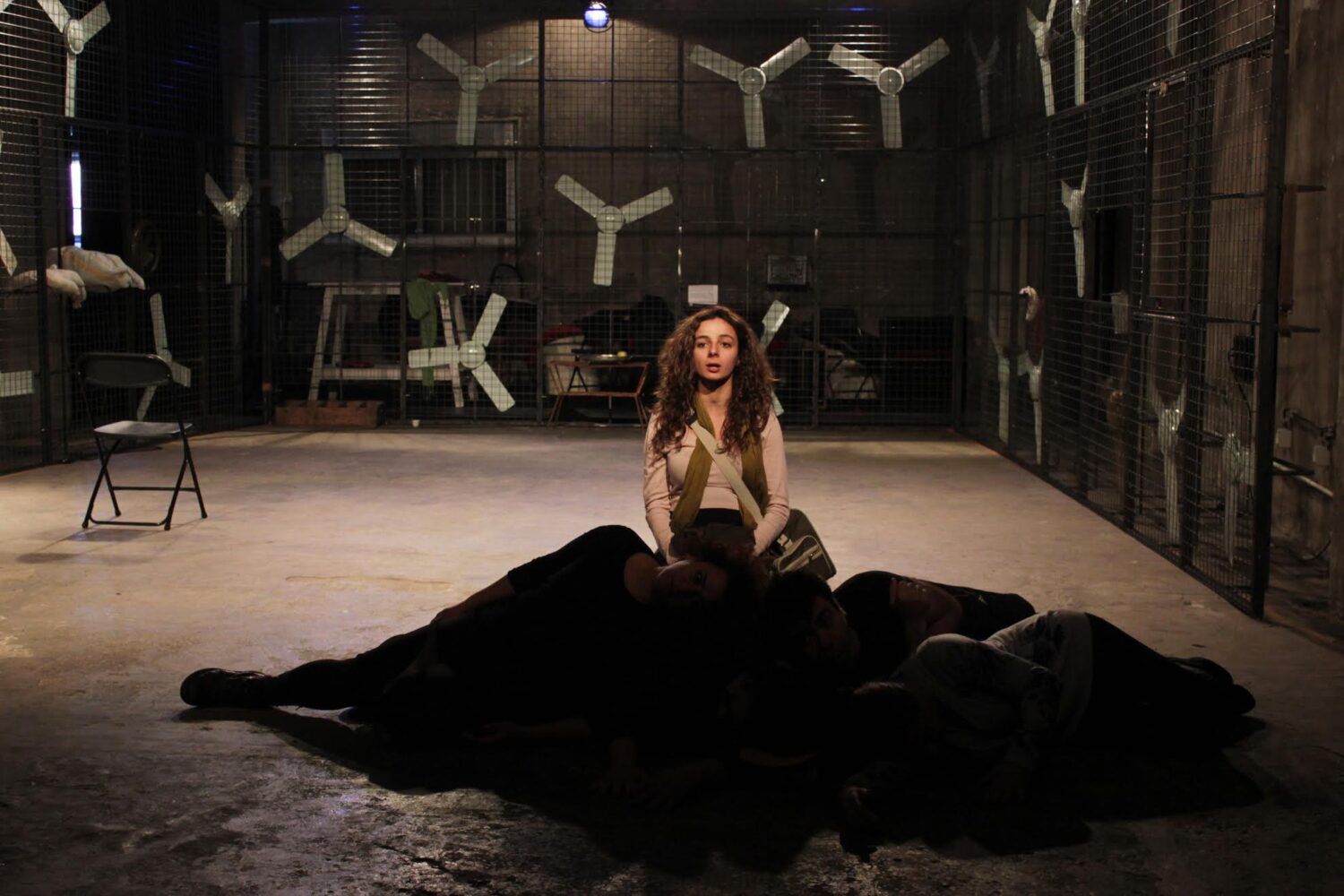
Photo by Marianne Kortbani.
In Egypt, Ghalia finally finds the father of her child. He cowardly denies being the father after her confronting him, and this is the moment the very blast sparkle of any remaining innocence is extinguished in Ghalia. This is the moment all remnants of the girl inside have died thus is the moment Ghalia becomes a woman. Ghalia does find some good men exist in this world and they help Ghalia pass from Libya.
Here Ghalia boards a boat full of refugees, and sets off away from this place dreaming of her “Eldorado” somewhere beyond these seas… Ghalia gives birth after 9 long months to her baby girl, floating out there in the vast ocean. Her and her child’s fate unknown.
Hats off to Maya Zbib and Omar Abi Azar who have managed to create a symbol for not only Arab women, but every woman who is marginalized in any part of the world. Ghalia finally belongs to the world.
Edited by Heath Doolan.
This post was written by the author in their personal capacity.The opinions expressed in this article are the author’s own and do not reflect the view of The Theatre Times, their staff or collaborators.
This post was written by Christiane Waked.
The views expressed here belong to the author and do not necessarily reflect our views and opinions.

